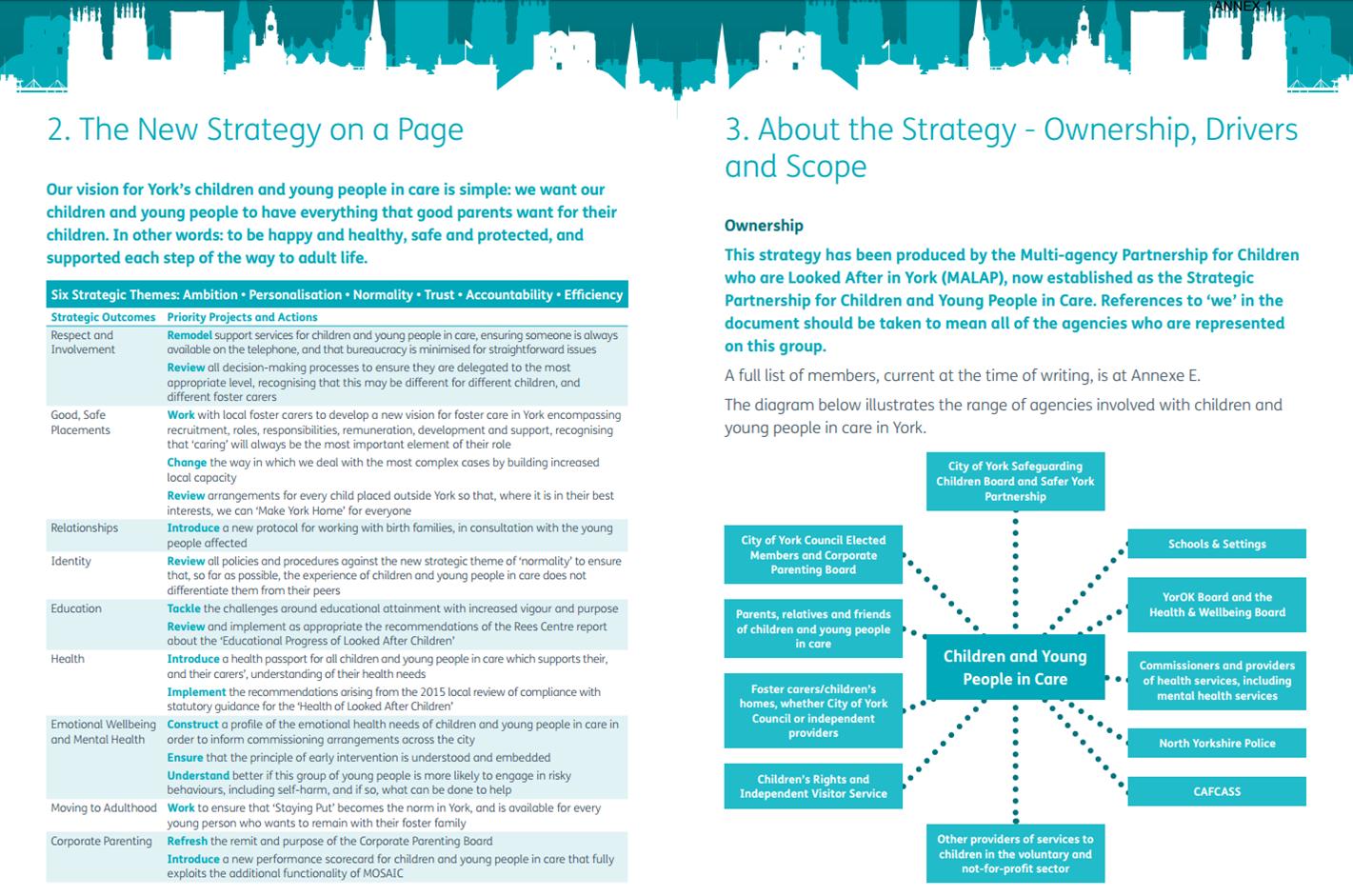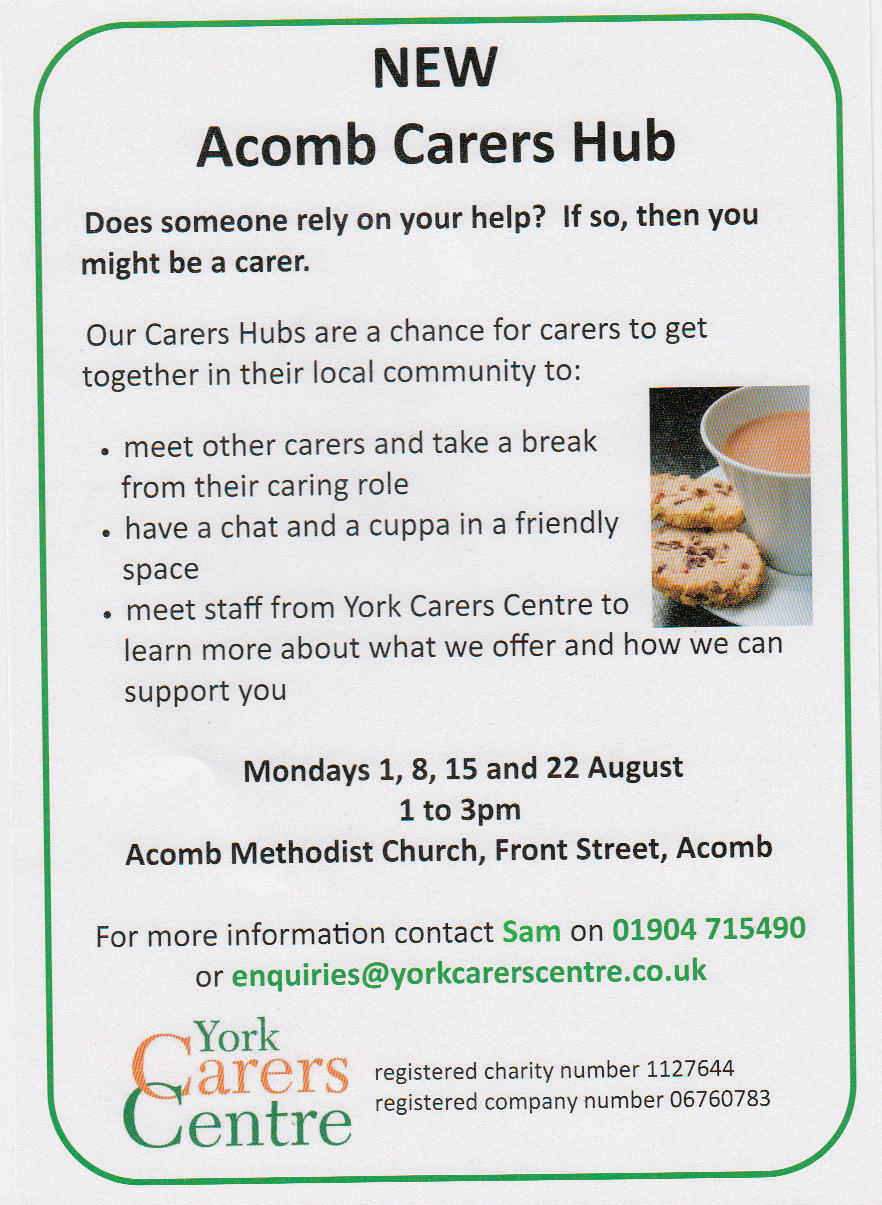
York residents get quicker access to dementia support
 Residents in York care homes could get quicker access to support dementia services thanks to a new trial to improve diagnosis rates.
Residents in York care homes could get quicker access to support dementia services thanks to a new trial to improve diagnosis rates.
City of York Council has teamed up with the Vale of York Clinical Commissioning Group (VoYCCG) and Dementia Forward*, to trial a new scheme to provide support and education for care home staff enabling them to screen residents for dementia. Historically, diagnosis required someone to visit their GP or hospital setting presenting with signs of dementia, meaning that many people didn’t receive information and support about their condition as early as possible.
The 12 month project is currently being trialled in eight care homes across the city, including City of York Council’s Haxby Hall and Windsor House. Early indications show that diagnosis rates have increased significantly, and the pilot will be rolled out to other public sector and private care homes across the city over the next few months.
Key staff at the care homes are trained how to use a national screening tool by Dementia Forward, before using it to assess their residents. If someone is assessed as having Dementia they, and their families and carers, can then be offered information and advice and the condition and support available locally, as well as using the Alzheimer’s Society toolkit ‘This is Me’ to help care workers support the resident in their care home.
Cllr Carol Runciman, Executive member for Adult Social Care and Health, City of York Council: “We know that early dementia diagnosis can make it easier for the individual and their family and carers to get the right help and support as soon as possible and help them live with the condition. We hope that this pilot will further improve diagnosis rates in York, supporting our aim to make York a Dementia Friendly City.”
Dr Louise Barker, from the Vale of York CCG, said: “I am delighted that this important project is now being trialled locally.
“For someone with dementia, changes such as moving to an unfamiliar place or meeting new people who contribute to their care can be unsettling or distressing.
“This training is helping care workers to build a better understanding of the person they are caring for and in turn enhance the support they provide.”
Jill Quinn from Dementia Forward says “We are delighted to be part of a project that joins everything up. We are working with care home staff, GPs, residents and their families. One of the most rewarding aspects has been the support we can provide to families and anything that raises awareness and improves dementia support is a positive thing.”
For more information about dementia support and services in York visit www.york.gov.uk/dementia
Work on new purpose-built accommodation for older people starts
 The initiative will see 25 one-bed apartments and two bungalows added to the existing site at City of York Council’s in-demand Glen Lodge facility. The project is part of the council’s plans to modernise accommodation for older people in the city, giving them more choice and control about the care and support they receive.
The initiative will see 25 one-bed apartments and two bungalows added to the existing site at City of York Council’s in-demand Glen Lodge facility. The project is part of the council’s plans to modernise accommodation for older people in the city, giving them more choice and control about the care and support they receive.
The Glen Lodge extension has been designed to provide ‘dementia ready’ accommodation, allowing people with dementia to continue to live independently in their own home, safely and sociably. The apartments and bungalows will be built alongside communal lounges, a landscaped garden and other facilities.
The £4.1m scheme is supported by a £850,500 grant from the Homes & Communities Agency.
The extension is the second phase of improvement work at Glen Lodge, which saw the help and support available to residents – known as ‘extra care’ – become available 24 hours a day, seven days a week earlier this year, making it easier for people with higher care and support needs to live at Glen Lodge.
With York’s population of people aged 75 and older expected to rise by 50 per cent by 2030, and with the popularity and quality of its current provision at Glen Lodge and extra care services at Auden House, these new plans are part of a city-wide scheme to modernise accommodation for older people.
(more…)
Executive snubs Lowfields residents
The York Council is to consult residents on a plan to build on most of the former Lowfields school site.
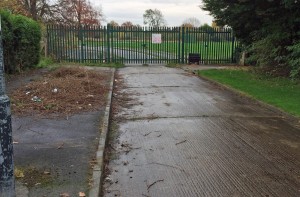
Former Lowfields School entrance
Last night members of the committee and officials refused to acknowledge the concerns about the plan which were tabled by local Councillor Andrew Waller.
The committee had been told of the results of a survey undertaken in the area over the last week (see foot of page).
The survey results – covering over 300 households – revealed that the community was dismayed at some of the remarks contained in an officer report.
In particular:
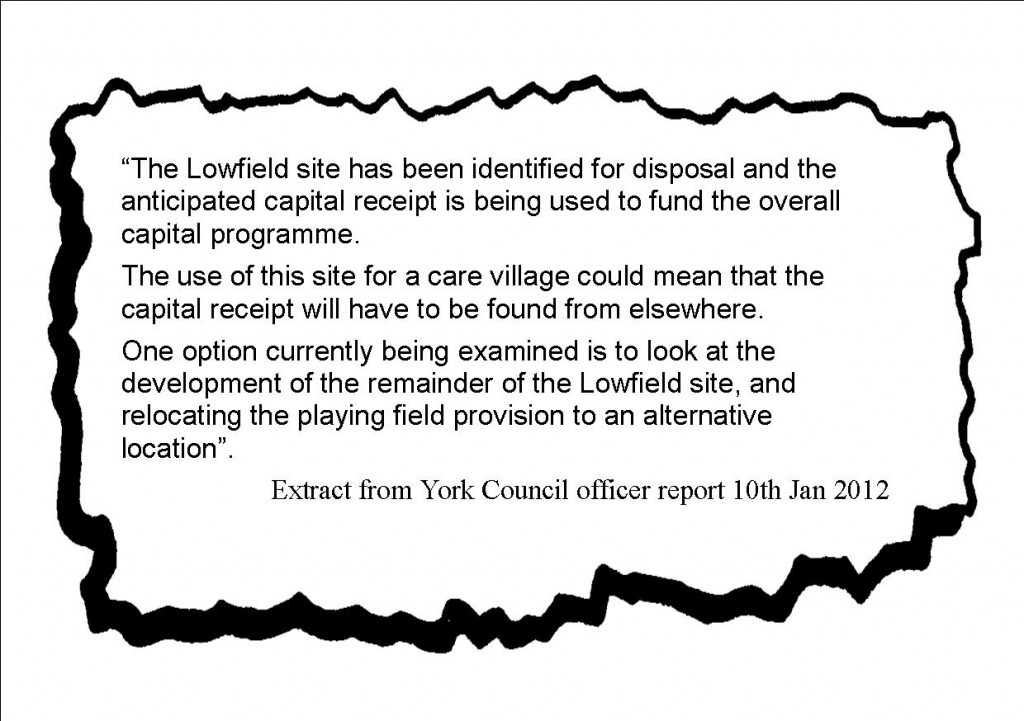
Labour Councillors first considered building on the football pitches in 2012.
- The suggestion that any development should be “piecemeal”. Residents have no desire to see construction traffic accessing the site over an extended period of time and are fearful that the maintenance standards that will apply to any undeveloped plots will be inadequate. They want to see an early completion of the whole of the site
- The inclusion of any “hospital”, police depot or GP surgery all of which would have an impact on 24/7 traffic volumes, put more pressure on parking spaces and bring noise and disturbance to what is otherwise an entirely residential area. Residents say that any “hub” facilities – such as a police desk – should be located at the Library on Front Street (where there is adequate expansion potential to the rear of the existing buildings)
- The reduction in open space to less than ½ the area of a football pitch is unacceptable. Residents want green space and want part of it to be allocated as a site for a nature reserve (lack of maintenance had de facto already effectively turned parts of the site into a wild life area over the last decade). Several have said that they would like to see a play park established.
- Building high density houses would exacerbate parking problems. Such problems are acute at the quoted paradigm comparator location (the top of Tedder Road). Bungalows and older persons (downsizing) apartments would be more acceptable as the number of vehicles owned by occupants of this type of property is likely to be low,
Many residents say that they hoped that the Council would agree to honour its historic commitment to the local community and restrict development to a 6.5 acre site.
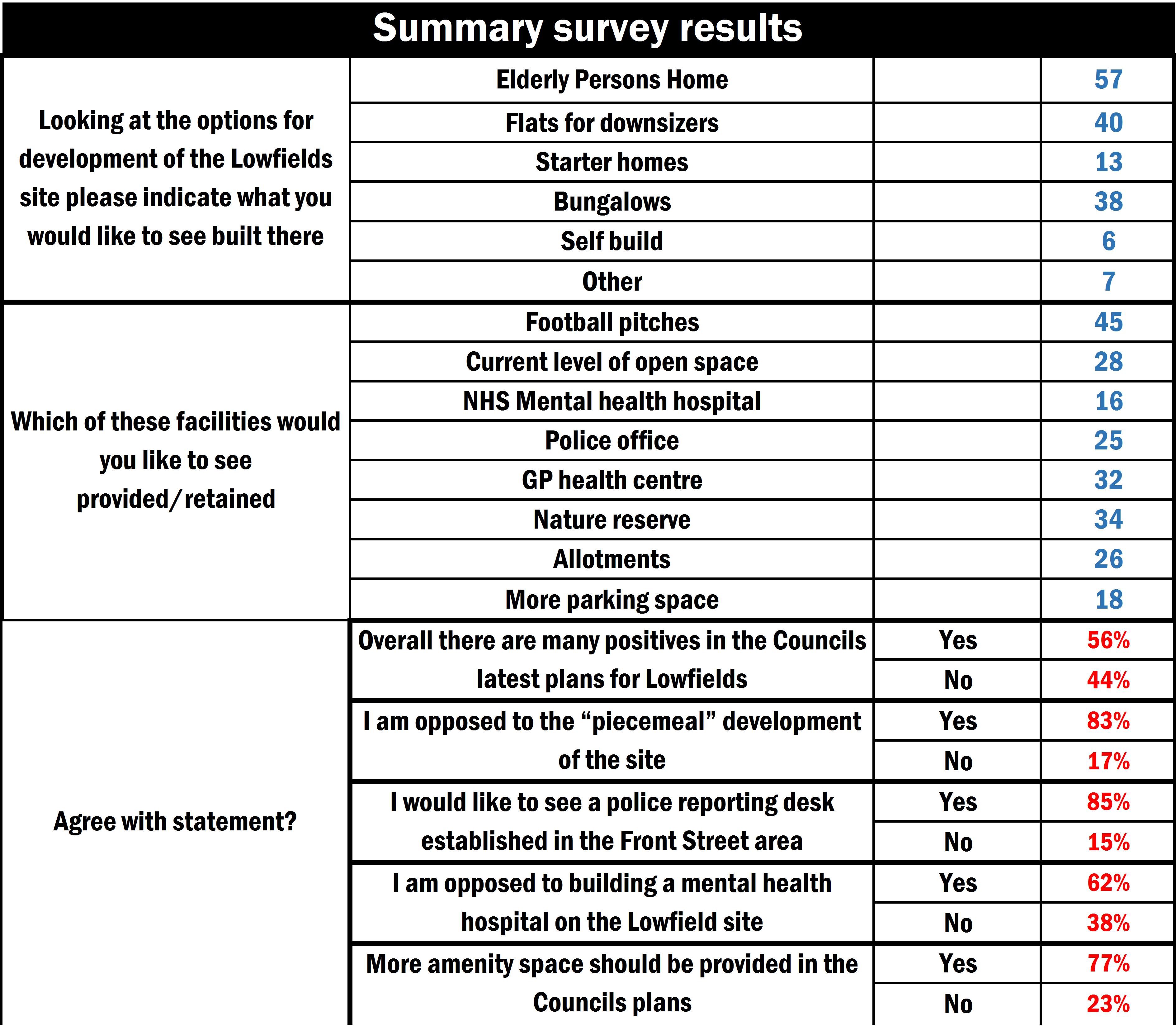
New plan for looked after children in York
York residents less happy with care services
Suicide rates up
 In York the most recent figures show that a total of 30 people died by suicide in York in 2013, decreasing to 16 in 2014 before increasing again to 28 in 2015.
In York the most recent figures show that a total of 30 people died by suicide in York in 2013, decreasing to 16 in 2014 before increasing again to 28 in 2015.
A report published this week raised other concerns about care services in the City,
“Delayed transfers of care from hospital, and those which are attributable to adult social care of NHS care and those which are attributable to adult social care have risen slightly since last year and, although they have not returned to poor levels seen 2013/14, York remains above (worse than) the national, family and regional average for these indicators”.
The overall satisfaction level for people who use care and support services shows a decrease from last year (64% down from 67% in 2014/15) and a sustained fall since 2013/14, with York performance now slightly below the regional and national averages.
There were two indicators where York had significantly worse outcomes compared with the England average: hospital admissions for self-harm for people aged 10-24 and hospital admissions for tooth decay for children aged between 1 and 4 years.
Available local data on self-harm for this age range shows that 80% of admissions were females, the largest group were females aged 15-19 and there were a number of young people with multiple admissions in the year. A self-harm needs assessment has recently been carried out to enhance understanding of this issue within the City.
There were 117 admissions for tooth decay in York over a three-year period and based on the England average only 83 would have been expected.
The figures are being discussed at a Council Executive meeting later today
Temporary accomodation plan for Acomb elderly persons home site
Acomb residents invited to Oakhaven redevelopment event
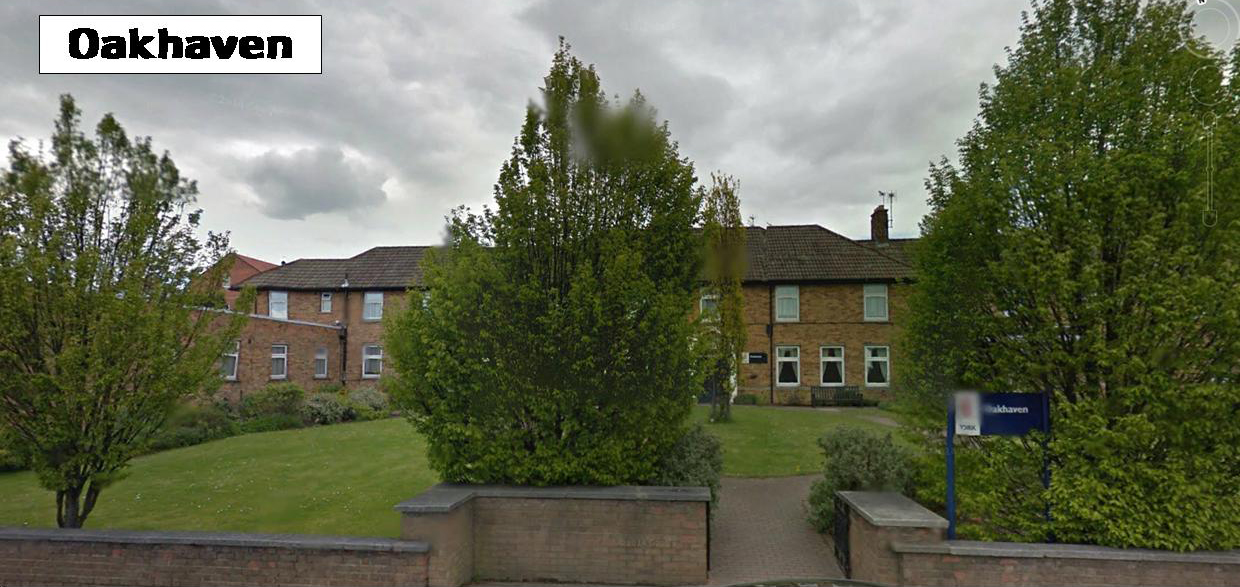
Oakhaven
Residents and businesses in the Acomb Road area of the city are being invited to find out more about the short and long term plans for the redevelopment of the former Oakhaven Older People’s Home next week (Tuesday 28 June).
The Councils plans for the Lowfields school site are expected to be published tomorrow
The council’s longer term plans for the site will see the creation of a new Extra Care facility for older people in the Acomb area: part of the authority’s Older People’s Accommodation Project which aims to secure high quality accommodation to meet the needs of York’s ageing population.
If approved, the flexible accommodation will enable residents, including those with complex care needs such as dementia, to live independently in their own homes on the site, with on-site personal care available 24 hours a day, seven days a week, should they need it.
The authority will shortly begin the process to find a partner to develop the facility at Oakhaven and in 2017 will seek planning consent for the new building.
In the immediate short term, the council is proposing to use the building as accommodation for up to 15 local families and individuals who need temporary accommodation. The facility will be managed by on-site staff seven days a week and the proposals will be subject to planning consent.
Local residents are being invited to attend the drop-in event next Tuesday (21 June) at Oakhaven between 4-7pm to find out more about the short and long term plans for the site.
Visit www.york.gov.uk/OPAplans for more information.
York Council care home rated ‘good’
Care and support services at one of City of York Council’s care homes have been rated as ‘good’ by independent inspectors.
Services at Morrell House, which specialises in dementia-care, were inspected by the Care Quality Commission (CQC) in May. It was described as good in all areas which included; ‘safe, effective, caring, responsive and well-led’ by the team of inspectors, who spoke to residents, relatives and members of staff as part of their visit.
The inspectors highlighted the meaningful caring relationships between staff and the people they supported, and that residents were relaxed and at ease in their surroundings. They also praised some of the team’s innovative dementia care, including the wearing of night clothes on night shifts- to reduce anxiety for people exploring the home overnight, the introduction of telehealth equipment to reduce hospital admissions, and the plans to use specialist lighting in communal areasto help residents with dementia to differentiate between day and night.
(more…)
Future of Lowfields school site to be considered on 30th June
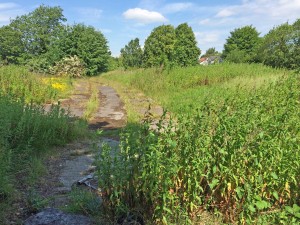
Lowfields school site is now overgrown
Only days after the NHS said it was considering building a Mental Health Hospital on the Lowfields school site, the York Council has slated the future of the location for debate on 30th June.
A new “Forward Programme” has been published which gives only 4 weeks notice of the discussion.
The three items down for decision are:
1. Move forward with plans for the re-development of the Lowfields school site, beginning with public engagement regarding use and design.
2. Consult on the closure of a further Older Persons’ Home in the autumn of 2016 and one in the first half of 2017, following the Moving Homes Safely Protocol.
3. Open negotiations to purchase land adjacent to Haxby Hall in order to facilitate the examination of options for its future.
The original intention had been to site an older persons “village” on the footprint of the former school site. This was subsequently abandoned when the then Labour led Council lost control of the project amidst escalating costs.
Instead, they decided to concentrate all resources on building a new “hub” on the east of the city at Burnholme.
This led to accusations that the Council was ignoring the needs of older people on the Acomb side of the City.
There now seems to be no chance of the Council finding money to develop the site itself.
Instead the hope is that it will be put on the open market (as it could have been two years ago) with bids being assessed against an agree set of criteria. If the aim remains to provide accommodation principally aimed at older people (the site is ideally located near to amenities) then a high weighting could be given to bids that can guarantee that outcome.
This is what the Council (belatedly) did when selling off the Oliver House elderly persons home for redevelopment. That site was subsequently sold to a company specialising in retirement properties.
This strategy has the added value that older people “downsizing” to Lowfields would free up more family sized accommodation elsewhere.
Residents will be keeping an eagle eye on the Council to ensure that no development intrudes onto the Lowfields playing fields.
There is a shortage of football pitches on the west of the City and potentially the former school playing field would also be an important amenity for any new community development.
Record number of disabled people in York get grants to adapt property
163 people qualified for disabled facilities grants in York last year.
This is the largest number ever recorded.
On average the cost of adaptations was £5,315.
People with disabilities can get a grant of up to £30,00 from the Council..
The types of work that can be undertaken include:
- widen doors and install ramps
- improve access to rooms and facilities – e.g. stair lifts or a downstairs bathroom
- provide a heating system suitable for your needs
- adapt heating or lighting controls to make them easier to use
Applications are means tested so some applicants are required to pay for part of the costs. Applicants are required to continue living in the adapted property for at least 5 years.
The total bill for adaptations came to over £1 million last year. However, this is much less than the equivalent cost of institutional care. The modifications allow residents to remain in their own homes even after suffering a decline in health.
The York Council also improved the speed with which it dealt with applications and the time taken to make grants.
More details for applicants can be found by clicking here

Disabled Facilities Grants – Response to FOI request

